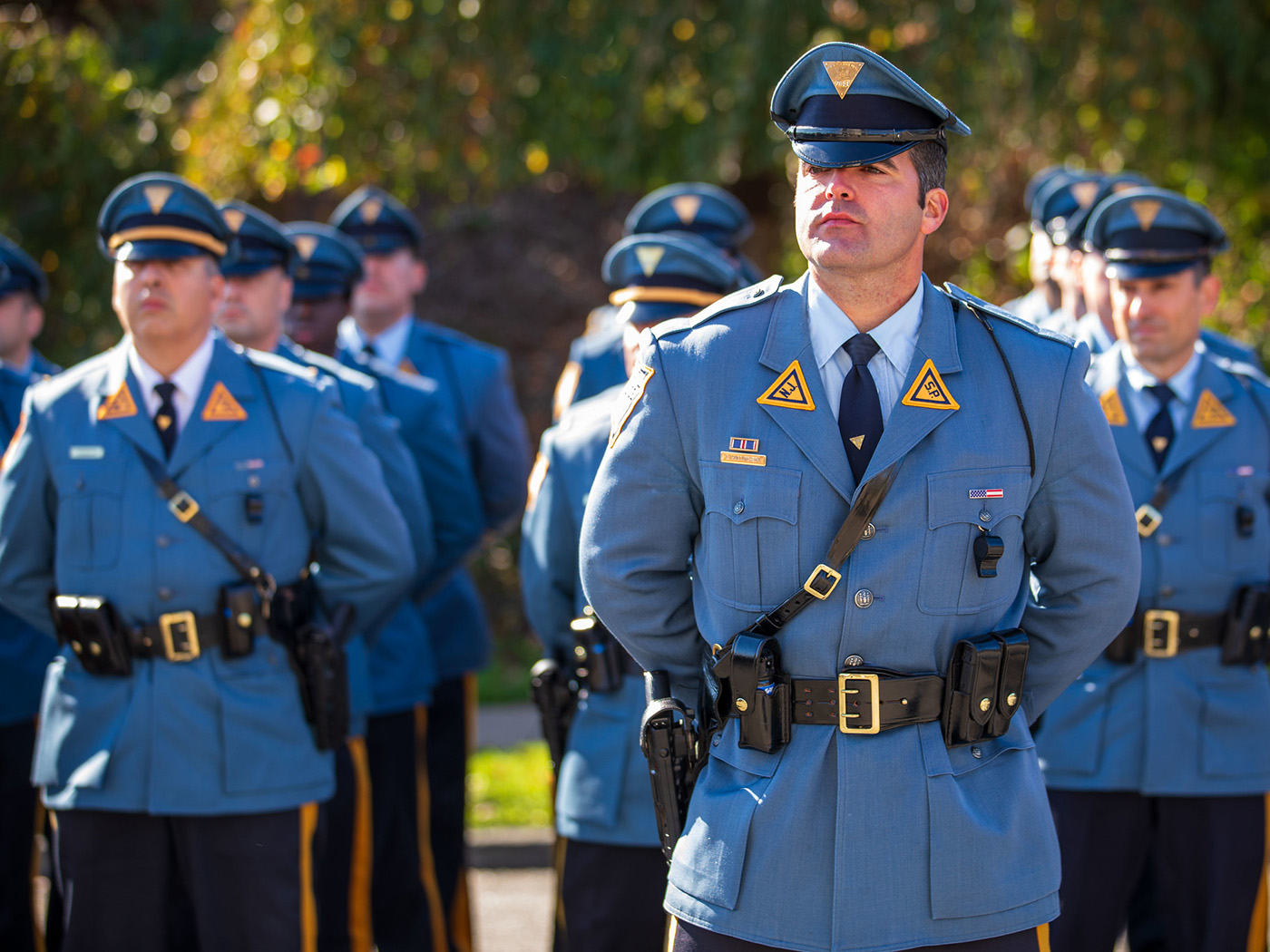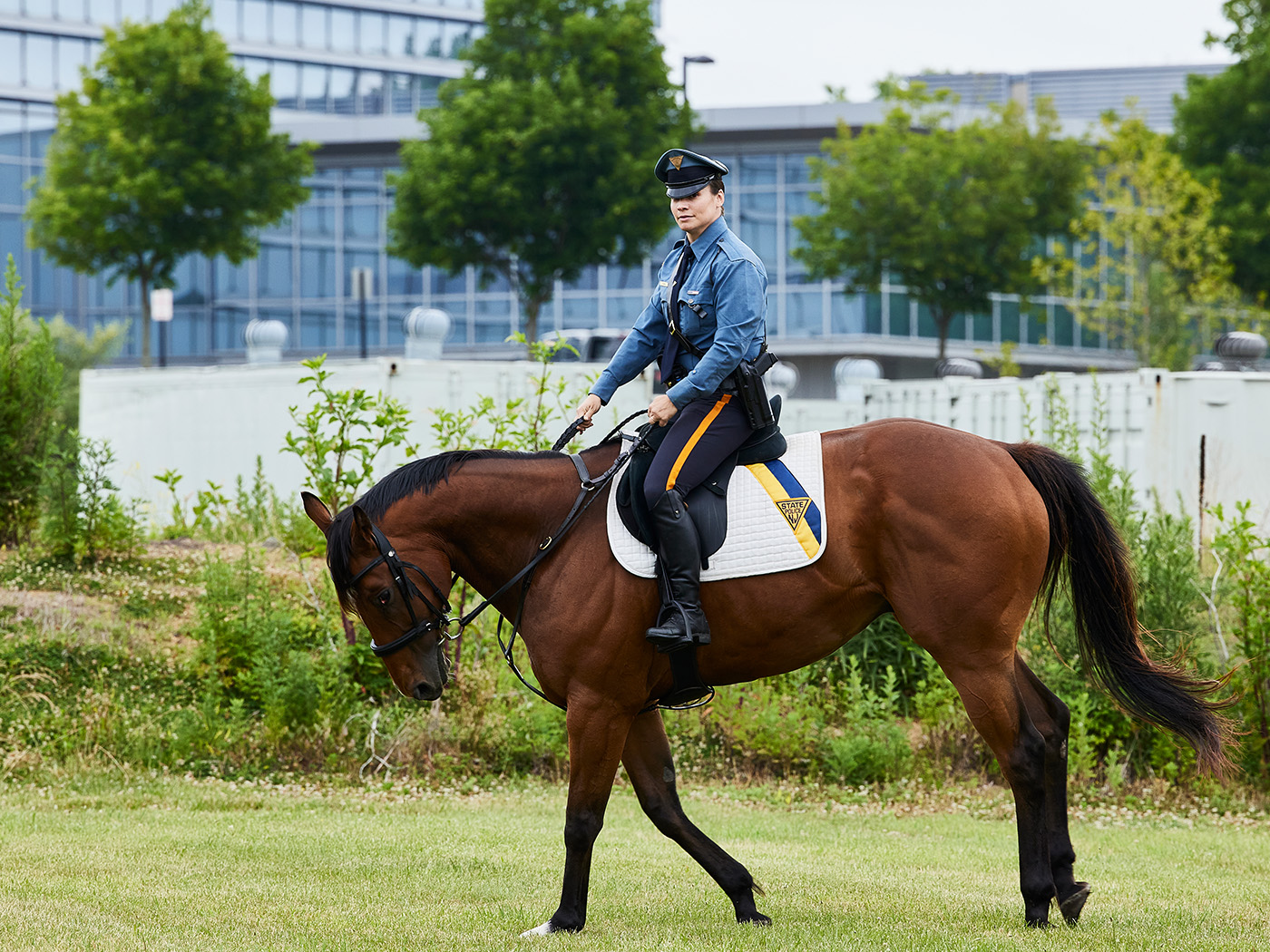Starting Salary
The starting salary for a trooper is $74,534.59. The second-year total compensation significantly increases to $86,022.54. Top pay for a Trooper I is $152,943.54. Troopers receive yearly increments.
All recruits receive $1,175.00 every two weeks. Room and board are also provided while training.
Work Schedule
Troopers typically work a 40-hour week on a variety of schedules. Overtime is voluntary, except in unusual circumstances, and is rewarded with premium pay or compensation time.
Holidays, Vacation & Sick Leave
-
There are 13 paid holidays. Troopers may voluntarily choose to cash out some or all of their 13 paid holidays for a lump sum payment.
-
Troopers are allotted one vacation day per month in the first year of service, as well as three personal days per fiscal year. The initial vacation allotment of 12 days increases after a trooper has been on the job for five years and increases at regular intervals after that.
- Sick leave is allotted.
Health Benefits
Troopers contribute to their health care premiums determined by salary scale and coverage type.
More information on healthcare plans available at:
Dental Coverage
For an optional biweekly payroll deduction, troopers may choose a “traditional” plan or a plan offered through an DMO system.
Prescription Plan
More information on healthcare plans available at:
Vision Care Program
The program provides for a partial reimbursement for the cost of eyeglass lenses, contact lenses, and the cost of the eye examinations.
Leave of Absence
Leaves of absence are available for such reasons as: pregnancy, child care, education, family leave or military service. These leaves are usually for not more than a year and must be approved.
Life Insurance
Enlisted members are covered by a group life insurance policy that provides 3 1/2 times their final average salaries in a lump sum to beneficiaries.
Retirement Package
The State Police Retirement System (SPRS) is overseen by a Board of Trustees which includes two members of the State Police. When a trooper retires, he or she can take advantage of a comprehensive retirement plan. The plan offers a wide variety of benefits, depending on years of service.
Mandatory Retirement
Everyone in the State Police must retire by age 55 except the Superintendent.
Pension
-
Enrollment in the SPRS is a condition of employment. Your employee contribution will be 9% of your annual salary.
-
Service Retirement: After 20 years of service as a New Jersey State Trooper, you are eligible to receive a pension, regardless of age, consisting of 50% of your final compensation.
-
Special Retirement: After 25 years of service as a New Jersey State Trooper, you are eligible to receive a pension, regardless of age, consisting of 65% of your final compensation plus 1% for each year above 25 years. The maximum benefit that you can receive under a special retirement is 70% of your final compensation.
-
Deferred Retirement: Troopers who serve for 10 years and then terminate their employment before qualifying for a service retirement are vested and thereby eligible for a pension benefit at age 55. The benefit is 2% of final compensation for each year of SPRS service.
-
Transfer of Former Membership: You can transfer former membership from a New Jersey State administered pension plan (e.g. PERS, TPAF, PFRS) to the SPRS. This service will qualify as SPRS service and can be used to qualify for retirement. For example, if you are currently enrolled as a member of a New Jersey State administered pension plan for 3 years, the 3 years will count as 3 years of SPRS service and will be counted towards retirement.
-
Optional Purchase of Former Membership: You can purchase former membership from a New Jersey State administered pension plan (e.g. PERS, TPAF, PFRS) to the SPRS. This service will qualify as SPRS service and can be used to qualify for retirement. For example, if you were previously enrolled as a member from a New Jersey State administered pension plan for 3 years, separated from that service withdrawing your contributions, you can purchase the 3 years from the State of New Jersey Division of Pension and Benefits. The 3 purchased years would then count as 3 years of SPRS service and will be counted towards retirement.
-
You may be eligible to purchase up to five years of public employment rendered in any state, county, municipality, school district, or public agency outside the State of New Jersey, provided the service rendered would have been eligible for membership in a New Jersey State-administered retirement system.
State Paid Health Benefits
-
Troopers who attain 25 years of service in the SPRS are entitled to State paid health benefits in retirement according to the terms of the bargaining agreement in effect at the time they reach 25 years of service. In accordance with statute, Troopers in retirement will contribute to their health care premiums determined by salary scale and coverage type, to a maximum 35% of their health premiums.
-
Troopers who do not attain 25 years of service in the SPRS before they retire or terminate employment may qualify for State paid health benefits in retirement if they have purchased former membership for a New Jersey State administered pension plan. The former membership purchased and the SPRS time must add up to 25 or more years to qualify.
-
Troopers who do not obtain a total of 25 years of state service due to mandatory age requirements will be afforded continuous State health benefits at no cost.
Pension Benefits & Disability
If a trooper retires because of a job-related accidental disability, he or she receives a pension equal to two-thirds of his or her final compensation. If a trooper retires as a result of a non-job-related disability, he or she is eligible for a pension of no less than 40% of his or her final compensation.
Information or questions regarding your eligibility for any retirement benefit should be directed to the Division of State Police, Personnel Bureau, Payroll & Benefits Unit at (609) 882-2000 ext: 2620.
















